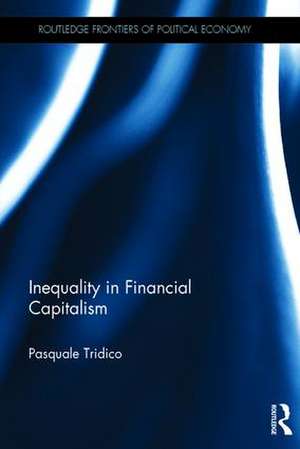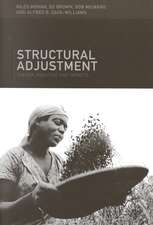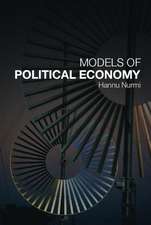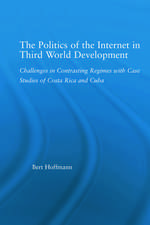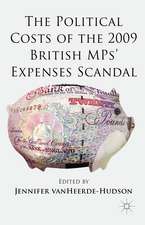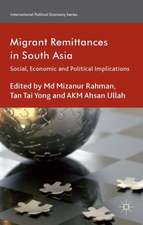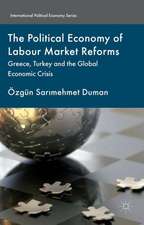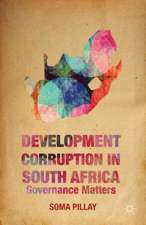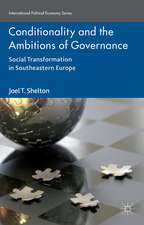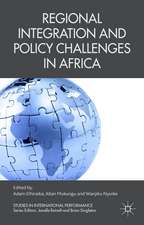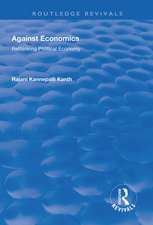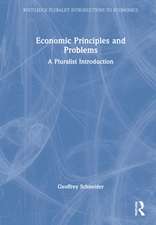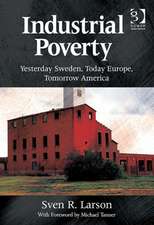Inequality in Financial Capitalism: Routledge Frontiers of Political Economy
Autor Pasquale Tridicoen Limba Engleză Hardback – 14 mar 2017
From the 1980s to the present day, this book considers the theoretical aspects of inequality (its foundations, definitions, approaches and origins) and examines empirical evidence of income inequality in a wide range of advanced economies. The key arguments in this volume are that income inequality increased during this period because labour and welfare became seen as costs to be compressed in "financial capitalism" rather than as a fundamental part of aggregate demand to be expanded. However, the welfare state is not a drain on economic performance and competitiveness, nor is it a barrier to economic efficiency. Instead, it is demonstrated that in countries that adopt "welfare capitalism", welfare state expenditure not only contributes to a reduction in inequality but also fosters economic growth.
Inequality in Financial Capitalism is of great importance to those who study economics, political economy, labour economics and globalisation.
| Toate formatele și edițiile | Preț | Express |
|---|---|---|
| Paperback (1) | 297.71 lei 6-8 săpt. | |
| Taylor & Francis – 27 iul 2018 | 297.71 lei 6-8 săpt. | |
| Hardback (1) | 1001.07 lei 6-8 săpt. | |
| Taylor & Francis – 14 mar 2017 | 1001.07 lei 6-8 săpt. |
Din seria Routledge Frontiers of Political Economy
-
 Preț: 309.90 lei
Preț: 309.90 lei -
 Preț: 309.79 lei
Preț: 309.79 lei -
 Preț: 316.03 lei
Preț: 316.03 lei -
 Preț: 310.95 lei
Preț: 310.95 lei - 9%
 Preț: 866.82 lei
Preț: 866.82 lei -
 Preț: 309.12 lei
Preț: 309.12 lei -
 Preț: 311.61 lei
Preț: 311.61 lei -
 Preț: 286.99 lei
Preț: 286.99 lei -
 Preț: 327.83 lei
Preț: 327.83 lei -
 Preț: 311.87 lei
Preț: 311.87 lei -
 Preț: 302.76 lei
Preț: 302.76 lei - 9%
 Preț: 938.48 lei
Preț: 938.48 lei -
 Preț: 152.67 lei
Preț: 152.67 lei -
 Preț: 151.97 lei
Preț: 151.97 lei -
 Preț: 318.54 lei
Preț: 318.54 lei -
 Preț: 317.95 lei
Preț: 317.95 lei -
 Preț: 310.01 lei
Preț: 310.01 lei -
 Preț: 326.49 lei
Preț: 326.49 lei -
 Preț: 155.44 lei
Preț: 155.44 lei -
 Preț: 309.79 lei
Preț: 309.79 lei -
 Preț: 328.76 lei
Preț: 328.76 lei -
 Preț: 281.72 lei
Preț: 281.72 lei -
 Preț: 286.58 lei
Preț: 286.58 lei -
 Preț: 386.12 lei
Preț: 386.12 lei -
 Preț: 353.78 lei
Preț: 353.78 lei -
 Preț: 325.09 lei
Preț: 325.09 lei -
 Preț: 310.55 lei
Preț: 310.55 lei -
 Preț: 371.95 lei
Preț: 371.95 lei -
 Preț: 324.87 lei
Preț: 324.87 lei -
 Preț: 312.86 lei
Preț: 312.86 lei -
 Preț: 374.16 lei
Preț: 374.16 lei -
 Preț: 329.09 lei
Preț: 329.09 lei -
 Preț: 348.22 lei
Preț: 348.22 lei - 28%
 Preț: 1047.06 lei
Preț: 1047.06 lei - 18%
 Preț: 1169.45 lei
Preț: 1169.45 lei - 18%
 Preț: 1555.17 lei
Preț: 1555.17 lei - 18%
 Preț: 1048.43 lei
Preț: 1048.43 lei - 18%
 Preț: 1059.84 lei
Preț: 1059.84 lei - 31%
 Preț: 767.47 lei
Preț: 767.47 lei - 18%
 Preț: 731.92 lei
Preț: 731.92 lei - 26%
 Preț: 822.54 lei
Preț: 822.54 lei - 18%
 Preț: 1796.21 lei
Preț: 1796.21 lei - 26%
 Preț: 1184.91 lei
Preț: 1184.91 lei - 18%
 Preț: 1120.23 lei
Preț: 1120.23 lei - 15%
 Preț: 700.95 lei
Preț: 700.95 lei - 18%
 Preț: 1116.31 lei
Preț: 1116.31 lei - 22%
 Preț: 299.52 lei
Preț: 299.52 lei
Preț: 1001.07 lei
Preț vechi: 1220.81 lei
-18% Nou
Puncte Express: 1502
Preț estimativ în valută:
191.56€ • 204.84$ • 159.71£
191.56€ • 204.84$ • 159.71£
Carte tipărită la comandă
Livrare economică 17 aprilie-01 mai
Preluare comenzi: 021 569.72.76
Specificații
ISBN-13: 9781138944121
ISBN-10: 1138944122
Pagini: 252
Ilustrații: 204
Dimensiuni: 156 x 234 x 22 mm
Greutate: 0.48 kg
Ediția:1
Editura: Taylor & Francis
Colecția Routledge
Seria Routledge Frontiers of Political Economy
Locul publicării:Oxford, United Kingdom
ISBN-10: 1138944122
Pagini: 252
Ilustrații: 204
Dimensiuni: 156 x 234 x 22 mm
Greutate: 0.48 kg
Ediția:1
Editura: Taylor & Francis
Colecția Routledge
Seria Routledge Frontiers of Political Economy
Locul publicării:Oxford, United Kingdom
Public țintă
Postgraduate and UndergraduateCuprins
Introduction: income inequality, labour market and uneven development during financial capitalism
Part I Definitions, approaches and origins of income inequality
1. Theories, methods and varieties of inequality
2. The determinants of income inequality in rich countries
3. Welfare capitalism versus financial capitalism during globalisation
Part II Financialisation and financial crisis: policies and empirical evidences
4. The foundation of the financial crisis: inequality and labour flexibility
5. Varieties of capitalism, regulations and responses to the financial crisis: the European social model versus the US model
6. Economic policies and growth strategies after the crisis: different approaches in the US, Japan and the EU
7. Why some countries performed better than others during the initial phase of the crisis
8. Global imbalances and declining hegemony: looking for a new paradigm after the financial crisis
9. Conclusion
Part I Definitions, approaches and origins of income inequality
1. Theories, methods and varieties of inequality
2. The determinants of income inequality in rich countries
3. Welfare capitalism versus financial capitalism during globalisation
Part II Financialisation and financial crisis: policies and empirical evidences
4. The foundation of the financial crisis: inequality and labour flexibility
5. Varieties of capitalism, regulations and responses to the financial crisis: the European social model versus the US model
6. Economic policies and growth strategies after the crisis: different approaches in the US, Japan and the EU
7. Why some countries performed better than others during the initial phase of the crisis
8. Global imbalances and declining hegemony: looking for a new paradigm after the financial crisis
9. Conclusion
Notă biografică
Pasquale Tridico is a professor at the Roma Tre University in Rome, Italy. He is director of the two-year master’s degree in labour market, industrial relations and welfare systems and director of the master’s in human development and food security. He is lecturer of labour economics and economic policy, and is the Jean Monnet Chair of Economic Growth and Welfare Systems. He is also general secretary of the European Association for Evolutionary Political Economy (EAEPE).
Descriere
From the 1980s to the present day, this book considers the theoretical aspects of inequality (its foundations, definitions, approaches and origins) and examines empirical evidence of income inequality in a wide range of advanced economies. The key arguments in this volume are that income inequality increased during this period because labour and welfare became seen as costs to be compressed in "financial capitalism" rather than as a fundamental part of aggregate demand to be expanded. However, the welfare state is not a drain on economic performance and competitiveness, or is it a barrier to economic efficiency.
